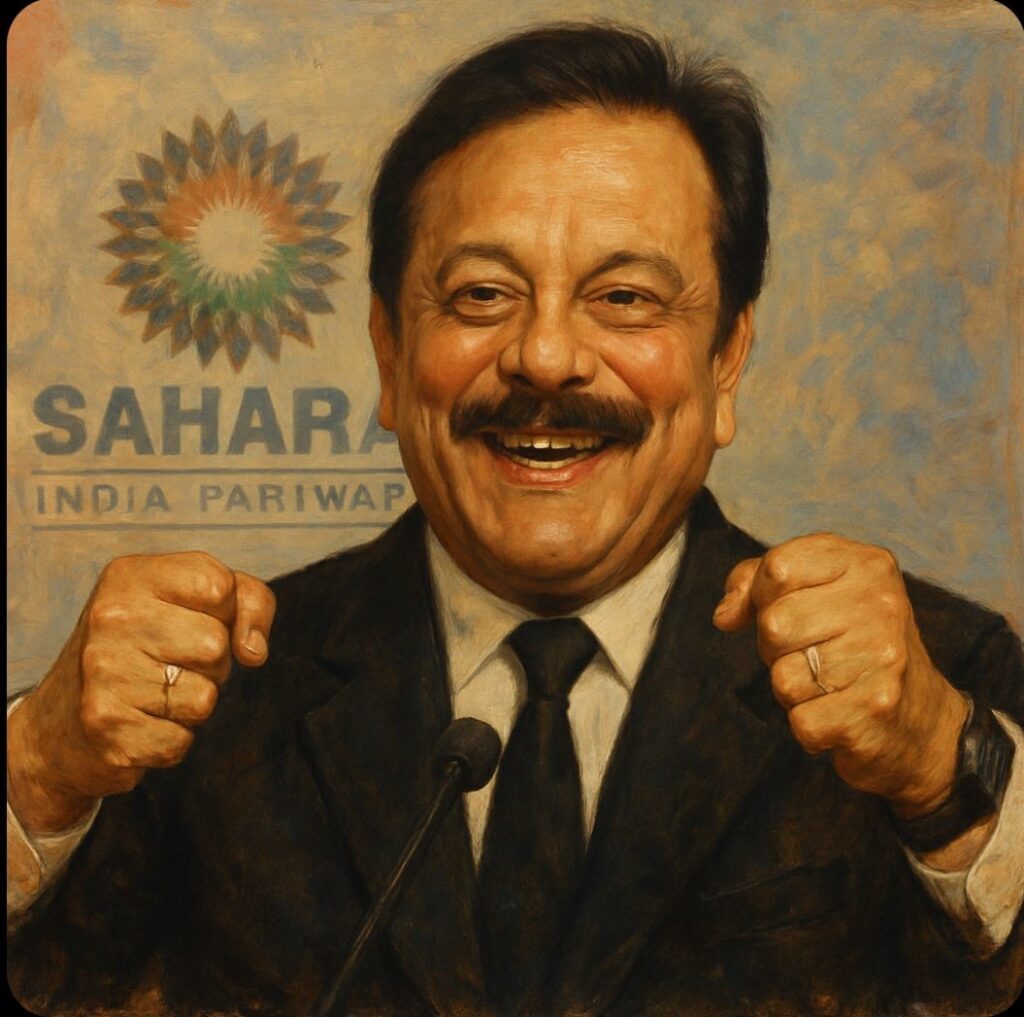The Empire That Chose To Die

Prologue: The Call That Changed the Trajectory
This is the ‘as it happened’ account of 5 incredible hours with the endearing Subrata Roy Sahara, affectionately known as ‘Saharashree‘ across his mammoth organisation. It was title that carried the force of devotion, the gravity of leadership, and the crushing burden of expectation. Those 5 hours opened a window into the inner politics of one of India’s most astonishing business empires; and how that empire, already under siege, was ultimately allowed to crumble.
“You must meet SaharaShree ; he will appreciate your experience.”
Sachin, an old, trusted friend said it casually, but those words set in motion a journey I recall with bittersweet clarity. What follows may help illuminate how India’s most formidable non-traditional business empire, one that once fired the national imagination in ways not seen since the early expansions of the Tatas and the Birlas, lost altitude, then lost air, and finally lost the will to save itself.
Reaching Saharashree was no ordinary matter. Sachin, who took it upon himself to broker access, laboured for weeks. Even senior industry hands found the approach labyrinthine. He wasn’t merely insulated; he was armoured, surrounded by concentric rings of handlers, fixers, adjutants, and gatekeepers collectively known as The Secretariat. Penetrating that human vault felt Herculean.
Then, one day, the line clicked and formality dissolved into inevitability:
“Sir, your meeting is confirmed. Please be punctual tomorrow.”
Lucknow tickets. Briefing notes. Financial runs. Strategy decks. I had 24 hours to compress a career’s worth of experience into a conversation with Shri Subrata Roy Sahara. I remember that call with an odd churn of relief and dread. I knew the stakes. I also knew that in India, confirmed rarely means assured.
Context: Standing Between Worlds
Those were difficult days. I had just stepped away from one formidable brand to join a fledgling political enterprise an immersion that taught me more than most MBAs ever will about the business of politics and what inevitably happens when political culture runs operating companies. A global posting in the UAE sat waiting, signed in principle, yet I resisted leaving India. I am, in every fibre, comfortable in the magnificent chaos of this country; it is the unpredictability that sharpens us.
So, this meeting mattered not as a trophy audience, but as an inflection point. The Sahara Group at that time stood in the crosshairs: regulatory pressure, policy disputes, persistent allegations around quasi-chit fund instruments, and centrally for me the sprawling, embattled media operations that included television networks and multiple content verticals. Layer atop that the visible heat radiating from the then-prevailing political dispensation, and you had a company fighting on every front.
Sahara’s counter-punch was pure theatre and pure nerve: unprecedented full-page newspaper advertisements defiant, declarative, and unmistakably personal. There had been nationalist corporate jousts before (who in policy circles could forget the Jain vs. Centre battles?), but what Sahara Shree staged felt like an Amitabh Bachchan ’80s script made real: the wounded yet unbowed protagonist staring down power with rolled-up sleeves and bottomless swagger.
This was the arena I was walking into
Countdown: Mumbai Pre-flight Chaos
I worked through the night, strategy architecture, restructuring pathways, capital instrument alternatives, brand rehabilitation lines, media turnaround math, and cross-vertical integration logic. When the Secretariat asked how long I would need, I answered without flinching: two and a half hours. The reply came back laughing, almost indulgent: “Impossible. Ten, twenty minutes maximum.”
I refused to trim a slide. “I’ll present in full,” I said. “He may leave whenever he chooses.”
First hurdle: reach the airport.
This was 2009. I was crawling through traffic toward the old Santa Cruz airport in Mumbai, fittingly located opposite Sahara Star. At Goregaon, traffic coagulated into one of those uniquely Mumbai jams, buses slewed diagonally, taxis locked nose-to-tail, auto-rickshaws wedged like shrapnel. Five kilometres might as well have been fifty.
Sachin stayed on the phone as I fought the clock. “I’m leaving home let me try to get to you,” he said. That is friendship in the trenches. With barely sixty minutes to departure, the odds of boarding were evaporating. These were pre-DigiYatra days: paper tickets, physical queues, manual counters, security lanes you had to earn.
Then came the call I dreaded making: I rang Suave Sharma ji at the Secretariat. “I may miss the flight.”
His response was crisp, chilled steel: “If you miss it, you miss it for quite some time.” No reschedule. Not that day. Possibly not for weeks.
My options narrowed to two: abandon the taxi and sprint, or trust to providence.
The Race Against Time
Thirty minutes to go. Check-in surely closed. I’d failed before the real conversation even began. Then destiny winked: the flight was delayed by twenty minutes ironically, the exact meeting window I’d been allotted. I remember thinking: Have I already spent the meeting just earning the right to show up?
A final reprieve came from an unexpected quarter: friends in the CISF posted at the airport. They hustled me through procedures with a speed born of urgency and memory. No favours asked, none abused, just professional efficiency applied at precisely the moment it mattered.
I ran, boarded, and collapsed into the narrow seat of a Canadian regional jet working the Mumbai–Lucknow sector. I refused the meal. Coffee only. Laptop open, presentation advancing slide by slide as the cabin lights dimmed.
If spirit alone could win mandates, I had already secured mine.
Arrival: Lucknow’s VVIP Theatre
At Lucknow, the forward door opened and I stepped into heat, humidity and ceremony. Two attendants stood landside holding a bouquet. For me. The surreal theatre of Lucknow’s VVIP culture unfolded at full volume. Pride, embarrassment, fatigue, and gratitude all collided. Had I been on time, the gesture would have felt celebratory; delayed, it felt redemptive.
Context sharpened the moment. The global financial crisis of 2008–09 had ripped through leadership hiring. Senior roles vanished overnight. I had gone from being a visible figure in India’s media-entertainment sector to wrestling with an existential vacuum. This meeting was oxygen.
We rolled out in a BMW toward Sahara’s offices. I didn’t dare ask if the meeting still held. I simply prayed the window remained open.
First Sight: The Corridor Encounter
Fate staged the introduction. As I entered the main administrative wing, he walked toward us. Subrata Roy Sahara himself. Slower steps. Appraising eyes. He was trying to place me without being prompted.
I stopped. I let hierarchy declare itself.
“Mr Kaul! Mr Kaul!” It was Mr Sharma ,the same gatekeeper who had nearly frozen me out. “We are already behind schedule,” he cautioned.
Sahara Shree turned, unhurried. “It’s quite all right. Come we’ll accommodate him.”
A door that had been bolted by protocol opened on nothing but personal discretion. In that instant, I understood two things: first, he noticed people; second, the system around him protected itself at least as much as it protected him.
The Presentation That Wasn’t Supposed to Happen
We entered a magnificent boardroom. I connected the laptop while narrating a macro sweep of Sahara’s current posture regulatory heat, public perception, capital structure strain, media drag, and the cultural premium the brand still commanded across its depositor base and employee galaxy.
In my head, a stopwatch counted down from twenty minutes. I half-expected a polite exit at Slide 6.
Instead, technology behaved (a miracle in itself), and he leaned in literally and intellectually. The questions came fast, surgical, and grounded in operating detail. In three decades of dealing with promoters, I had rarely seen that mix of breadth, depth, and listening discipline. Most promoters want confirmation of what they already believe. He wanted to interrogate assumptions.
He drilled into:
- Group financing structures and regulatory optics.
- Restructuring pathways and staged deleveraging
- IPO sequencing versus private placements.
- Cross-vertical synergies spanning FMCG, infrastructure, hospitality, and the chaotic broadcast-and-print media stack.
- Execution control and more
I was amazed at his keenness and a youthful enthusiasm to outgrow the industry.
“How will this work if you are based in the UAE? Will you drive it yourself?”
“I will move,” I replied. “Fully. India base.”
Twenty minutes became forty. Forty became ninety. We went on for four hours.
When I finally stopped, I apologised for missing the original slot. He waved it off. “You’ve taken nothing,” he said, motioning to the untouched service tray. He had a chair pulled beside his own. He had waited and we ate together.
“Ashish, you know I have two sons?” he asked. I nodded and named them, respectfully, carefully. He smiled, then lifted the intercom. “Sharma ji, call OP.”
OP Srivastava, Managing Director, Sahara Group came on the line. “I’ve met this gentleman,” Sahara Shree said. “Arrange a full board meeting. Everyone will be present. He will present to you all. After that, he will speak to me directly.”
” Where is he staying” he enquired from Sharma Ji who looked at me while he fumbled for an answer. Saharashree was quick to understand; ” I have a few friends here in Lucknow and I will be staying with them” I responded.
“You are my guest,” he insisted.
“Show him around” he asked Sharma Ji; “Choose any place in Sahara City, It is your home.” His generosity was genuine. He wasn’t obliged in any way to look after me. I have come to believe that greatness is the sum of small little gestures.
Suites were shown; hospitality was royal. Yet I needed mental space. I phoned a dear friend Deep, a senior correspondent with a national English daily. We rendezvoused at a city junction. I stepped out of a BMW and climbed onto his motorcycle. Sahara staff looked stunned. I needed the wind more than the leather.
We talked late into the night at Deep’s home, deconstructing every nuance.
Mumbai Return: The Boardroom Trial by Fire
Back in Mumbai, I powered on my phone. Seventy-two missed calls. Most were from someone close to the Chairman panicked that I had spent four hours with him after missing my slot. The inner ring was rattled. I was supposed to come through them, not past them.
Then OP called. Board review at Sahara Star, Mumbai. Full quorum: eight to ten board members, one of Sahara Shree’s sons (who oversaw media), and senior finance, regulatory, and brand personnel. OP asked, “How much time do you need?” I answered, “Several hours.” He cut me off: “Thirty minutes.”
We began. We went on for four hours again.
This time the mood was more brittle. I highlighted gap after gap: media burn, capital inefficiency, dilution of brand equity, failure to integrate data from deposit-taking arms into marketing intelligence loops, and the near-total absence of professional risk-modelling discipline across vertical silos. Some Board faces tightened. Family members shifted in the chairs uncomfortably. Rarely do family members and coterie enjoy being shown the unvarnished mirror.
But numbers don’t tremble. Every data point was validated. Line items reconciled. Market comparisons cross-checked. The deck was bulletproof.
When it ended, after the brief lull, OP crossed the length of the Board room and embraced me. “Ashish, this is exactly what we need what we should have done long ago. When can you start?” He would not let me leave without a commitment.
I reminded him: “Saharashree has asked me to speak to him after your consent on this proposed restructuring plan”. OP nodded. “Yes. Yes ! Do that immediately. We need this”
By then the conversation had leaped past advice into a mandate. Sahara Shree had already asked what role I would take. I had answered plainly: “Group-level leadership across businesses. “His response in Lucknow had been immediate: “Excellent. Perfect.”
Sachin and I met that night to map out the next steps. I was elated. India, not overseas. Transformation over maintenance. Impact over title.
Waiting for the Call That Never Came
Days passed. Then a young staffer from the Secretariat called, breathless with enthusiasm: “Sir, when are you joining as Group CEO? Everyone is talking.” I hadn’t received formal papers, but the corridors were buzzing.
Then long silence.
The same sinking feeling I’d had in that Mumbai traffic jam returned. We chased Sharma ji. “No update,” he repeated. I reminded him of the Chairman’s explicit instruction that I speak to him after the board session. Still no movement.
A month dragged by on frayed nerves and sleepless nights. Finally, I called a friend in Lucknow. He was stunned I’d heard nothing. “I’ll find out,” he promised.
He called back late at night, his voice heavy. “Sir… we’ve been told not to let this meeting happen.” He named names. People whose internal turf, reputations or worse were threatened by what my presentation had revealed. Inefficiencies. Intellectual capture. Possibly financial leakages. The system was closing ranks against reform.
The meeting never rematerialized.
Moving On
Time, like capital, redeploys. I eventually accepted the UAE assignment I had deferred. Professionally, it was the rational move. Personally, it felt like leaving a patient mid-surgery because the family had locked the operating theater.
From a distance, I watched headlines tighten, investigations escalate, and pressure mount. I had laid out, slide by slide, how Sahara could restructure, clean up its optics, rationalize capital, professionalize media, and negotiate with regulators from a position of measurable compliance. None of it was rocket science. All of it required political will and the permission of the cabal.
Neither arrived in time.
Denouement: He Listened, He Trusted, He Was Betrayed
Airlines. Retail. Malls. Infrastructure. Hospitality. Financial products. A people-dependent ecosystem spanning hundreds of thousands of livelihoods. The cost of turf over truth is measured not only in rupees but in futures foreclosed.
Whatever else may be said of him, Sahara Shree knew how to look after people. Even an outsider who arrived late, disrupted protocol, and insisted on telling him what he did not want to hear. He listened. He fed me. He opened doors. He offered trust.
When I later heard of his arrest, I knew instinctively that kind of public unseating wounds something deeper than balance sheets. Whether one agreed with his methods or not, the personal blow was seismic. Empires rarely survive when the founder’s moral centre perceived or real collapses under the weight of investigation, litigation, and political crossfire.
And so, the empire that could have been stabilized fractured instead, taking with it the aspirations of countless employees, depositors, partners, and families who had believed in a vision grander than the structures built to defend it. The tragedy is not that an empire fell; empires fall all the time. The tragedy is that it might have been saved, and those empowered to help save it chose self-preservation over structural repair.
What Endures
Memory. Lessons. Warnings. Hope.
If there is a single takeaway for promoters, boards, and political-business hybrids across India, it is this: Empires do not collapse because of external attack alone. They collapse when internal guardians confuse gatekeeping with governance.
I offer this account not as hindsight heroism, but as documentary memory of a narrow window when transformation was both possible and invited. The sequence you have read is precisely as it unfolded. The names are as remembered. The opportunities were real so was the man; a gentleman entrepreneur India remembers as ‘Saharashree’.



Great experience great article…. Reminded me of old days in Hon. Saharashri